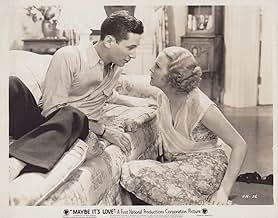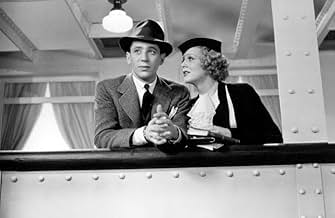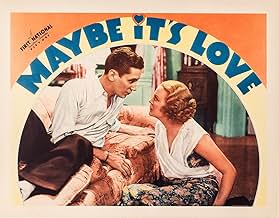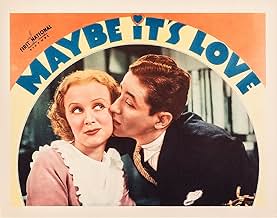Füge eine Handlung in deiner Sprache hinzuA young couple in love who face economic woes once they're wed.A young couple in love who face economic woes once they're wed.A young couple in love who face economic woes once they're wed.
Arthur Aylesworth
- Diner
- (Nicht genannt)
Eddy Chandler
- Motor Cop Driver
- (Nicht genannt)
Heinie Conklin
- Second Complaining Husband
- (Nicht genannt)
Billy Dooley
- Louie - the Counterman
- (Nicht genannt)
Betty Farrington
- Second Complaining Wife
- (Nicht genannt)
Paul Hurst
- Expressman
- (Nicht genannt)
Empfohlene Bewertungen
Maybe It's Love (1935)
** 1/2 (out of 4)
Predictable but amusing romantic comedy from Warner has Gloria Stuart (The Invisible Man) playing a secretary who is waiting for the man she loves (Ross Alexander) to marry her but she must use another man to make him jealous. After they're finally married, both realize that the married life is harder than they thought. The story here certainly isn't anything new but the glowing charm of Stuart really makes this film a lot better than the script deserved. There's also some great character actors who add wonderful support and they include Cagney's buddy Frank McHugh as the brother-in-law, Henry Travers as the father and Ruth Donnelly as the sister. All three add some nice laughs to the film with McHugh stealing the film as the dimwitted sap. There are a couple problems with the film and one of them is Alexander who just isn't charming enough for the role. Another problem is that the film runs 63-minutes, which is too short because it leads to a major plot gap towards the end of the film. One scene the couple is happily married and then out of no where they are fighting and breaking up. This film certainly isn't a classic but if you're a fan of any of the actors then it's worth viewing once.
** 1/2 (out of 4)
Predictable but amusing romantic comedy from Warner has Gloria Stuart (The Invisible Man) playing a secretary who is waiting for the man she loves (Ross Alexander) to marry her but she must use another man to make him jealous. After they're finally married, both realize that the married life is harder than they thought. The story here certainly isn't anything new but the glowing charm of Stuart really makes this film a lot better than the script deserved. There's also some great character actors who add wonderful support and they include Cagney's buddy Frank McHugh as the brother-in-law, Henry Travers as the father and Ruth Donnelly as the sister. All three add some nice laughs to the film with McHugh stealing the film as the dimwitted sap. There are a couple problems with the film and one of them is Alexander who just isn't charming enough for the role. Another problem is that the film runs 63-minutes, which is too short because it leads to a major plot gap towards the end of the film. One scene the couple is happily married and then out of no where they are fighting and breaking up. This film certainly isn't a classic but if you're a fan of any of the actors then it's worth viewing once.
"Maybe It's Love" is a strange little Depression-era film...one that was later remade as "Saturday's Children". It's strange because it seems to say that poverty will destroy marriages...but during the Depression nearly everyone was poor and they somehow managed to muddle through and live their lives.
Bobby and Rims (Rims???) have been dating for some time and seem to love each other. But when their boss brings his ne'er do well son into the company, he pays a lot of attention to Bobby (it's s SHE) and Rims gets jealous. In fact, again and again, they argue and they settled all this by getting married. Not the smartest reason to marry, I know. Well, after marrying Rims insists (insanely) that she stay home and not work...which might have made sense if they had any kids...though they didn't. Pressures besiege them and the marriage falls apart.
I felt very lukewarm about this film....mostly because the couple's problems didn't seem that difficult to overcome. Had the wife simply gone back to work (at least until they had kids) so many of their problems wouldn't have existed. And, it also is difficult to love the film when BOTH Bobby and Rim were easy to dislike. Overall, a mildly interesting film that could have easily been better....same with the later remake.
Bobby and Rims (Rims???) have been dating for some time and seem to love each other. But when their boss brings his ne'er do well son into the company, he pays a lot of attention to Bobby (it's s SHE) and Rims gets jealous. In fact, again and again, they argue and they settled all this by getting married. Not the smartest reason to marry, I know. Well, after marrying Rims insists (insanely) that she stay home and not work...which might have made sense if they had any kids...though they didn't. Pressures besiege them and the marriage falls apart.
I felt very lukewarm about this film....mostly because the couple's problems didn't seem that difficult to overcome. Had the wife simply gone back to work (at least until they had kids) so many of their problems wouldn't have existed. And, it also is difficult to love the film when BOTH Bobby and Rim were easy to dislike. Overall, a mildly interesting film that could have easily been better....same with the later remake.
Maxwell Anderson's very popular 1927 play, with 3 television productions as well as the three movies versions, has some very funny moments. The top-notch cast has Gloria Stuart, of Titanic (1996) fame, and Ross Alexander as the romantic leads in a seesaw romance. The highlight of the movie is the way Stuart gets Alexander to marry her, as coached by big sister Ruth Donnelly, who supplies cues in shorthand, and accurately predicts Alexander's responses to Stuart's actions and statements. I couldn't stop laughing at the entire sequence, even though I had seen the remake, Saturday's Children (1940). Unfortunately, the second half of the movie doesn't sustain the comedy of the first half, and degenerates into more of a drama about the difficulties in marriage. Still, the movie is a winner.
Classic young lover's making the mistakes, young marriage couple's make. I love the car's from the late 20's used in the filming. Fred McHugh, Ruth Donnelly plus Henry Travers the fellow that played the angel in It's a Wonderful Life. Great movie !
One would never suspect that this little domestic comedy comes from the pen of Maxwell Anderson, since it's no more than a typical piece of Depression-era fluff about money and finances being the root of most domestic squabbles.
Lovely GLORIA STUART (so beautiful in her prime) and ungainly ROSS Alexander (he never made it to stardom) are the leads and the supporting cast is a pleasant one filled with Warner contract players. But it's PHILLIP REED, as a rich man's playboy son, who should have had the romantic lead opposite Stuart, looking like a Tyrone Power clone, and not a bad actor at all.
HENRY TRAVERS, RUTH DONNELLY, FRANK McHUGH and others are well used, with McHugh being much less obnoxious than usual in his more subdued comedy role as Donnelly's husband.
It starts out briskly, with a lot of talk about "the situation in Europe" and "how Europe is making out" as part of the breakfast talk, so it seems that it's going to be a better than usual domestic tale that raises some serious issues. But before it's midway through, it gets stuck in a rut as no more than an office romance that ends in marriage but quickly falls into silly lover's spats and quarrels over finances and the inability to "live on a budget".
From that midway point on, it descends into a trivial domestic comedy with pat situations complete with a cornball ending that reunites the lovers under trying circumstances.
Summing up: Not worth the trouble. I note from another comment that this became a remake called "Saturday's Children" in the '40s with John Garfield, Ann Shirley and Claude Rains.
Trivia note: Ross Alexander was an up and coming Warner contract player who appeared the same year in "A Midsummer Night's Dream" and "Captain Blood" and was being considered for bigger roles, but he committed suicide two years later over problems with his marriage and rumors of his homosexuality which the studio tried to suppress.
Lovely GLORIA STUART (so beautiful in her prime) and ungainly ROSS Alexander (he never made it to stardom) are the leads and the supporting cast is a pleasant one filled with Warner contract players. But it's PHILLIP REED, as a rich man's playboy son, who should have had the romantic lead opposite Stuart, looking like a Tyrone Power clone, and not a bad actor at all.
HENRY TRAVERS, RUTH DONNELLY, FRANK McHUGH and others are well used, with McHugh being much less obnoxious than usual in his more subdued comedy role as Donnelly's husband.
It starts out briskly, with a lot of talk about "the situation in Europe" and "how Europe is making out" as part of the breakfast talk, so it seems that it's going to be a better than usual domestic tale that raises some serious issues. But before it's midway through, it gets stuck in a rut as no more than an office romance that ends in marriage but quickly falls into silly lover's spats and quarrels over finances and the inability to "live on a budget".
From that midway point on, it descends into a trivial domestic comedy with pat situations complete with a cornball ending that reunites the lovers under trying circumstances.
Summing up: Not worth the trouble. I note from another comment that this became a remake called "Saturday's Children" in the '40s with John Garfield, Ann Shirley and Claude Rains.
Trivia note: Ross Alexander was an up and coming Warner contract player who appeared the same year in "A Midsummer Night's Dream" and "Captain Blood" and was being considered for bigger roles, but he committed suicide two years later over problems with his marriage and rumors of his homosexuality which the studio tried to suppress.
Wusstest du schon
- WissenswertesThe original play, "Saturday's Children", opened 26 January 1927 on Broadway in New York City at the Booth Theatre and ran for 310 performances.
- PatzerWhen Florrie comes home carrying an armload of boxes and kicks the apartment door closed behind her, you can see a crew member grab the outer door knob to make sure the door doesn't bounce open.
- Zitate
Bobby Halevy: I don't want a husband, I want a lover!
- VerbindungenRemade as Lux Video Theatre: Saturday's Children (1950)
- SoundtracksLet It Be Me
(1935) (uncredited)
Music by Allie Wrubel
Played during the opening photo credits and often throughout the picture
Top-Auswahl
Melde dich zum Bewerten an und greife auf die Watchlist für personalisierte Empfehlungen zu.
Details
- Laufzeit
- 1 Std. 3 Min.(63 min)
- Farbe
- Sound-Mix
- Seitenverhältnis
- 1.37 : 1
Zu dieser Seite beitragen
Bearbeitung vorschlagen oder fehlenden Inhalt hinzufügen


























